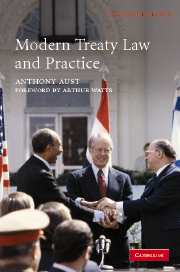Book contents
- Frontmatter
- Contents
- Foreword to the first edition by Sir Arthur Watts
- Preface to the second edition
- Articles of the Convention cited in the text
- Table of treaties
- Table of MOUs
- Table of cases
- Glossary of legal terms
- List of abbreviations
- Introduction
- 1 Vienna Convention on the Law of Treaties 1969
- 2 What is a treaty?
- 3 MOUs
- 4 Capacity to conclude treaties
- 5 Full powers
- 6 Adoption and authentication
- 7 Consent to be bound
- 8 Reservations
- 9 Entry into force
- 10 Treaties and domestic law
- 11 Territorial application
- 12 Successive treaties
- 13 Interpretation
- 14 Third states
- 15 Amendment
- 16 Duration and termination
- 17 Invalidity
- 18 The depositary
- 19 Registration and publication
- 20 Dispute settlement and remedies
- 21 Succession to treaties
- 22 International Organisations
- 23 Drafting and final clauses
- Appendices
- Index
21 - Succession to treaties
- Frontmatter
- Contents
- Foreword to the first edition by Sir Arthur Watts
- Preface to the second edition
- Articles of the Convention cited in the text
- Table of treaties
- Table of MOUs
- Table of cases
- Glossary of legal terms
- List of abbreviations
- Introduction
- 1 Vienna Convention on the Law of Treaties 1969
- 2 What is a treaty?
- 3 MOUs
- 4 Capacity to conclude treaties
- 5 Full powers
- 6 Adoption and authentication
- 7 Consent to be bound
- 8 Reservations
- 9 Entry into force
- 10 Treaties and domestic law
- 11 Territorial application
- 12 Successive treaties
- 13 Interpretation
- 14 Third states
- 15 Amendment
- 16 Duration and termination
- 17 Invalidity
- 18 The depositary
- 19 Registration and publication
- 20 Dispute settlement and remedies
- 21 Succession to treaties
- 22 International Organisations
- 23 Drafting and final clauses
- Appendices
- Index
Summary
The international lawyer seeking a way out of this marshland is as likely as ever to be led into the centre of the miry bog itself.
Despite this warning ringing in our ears, we must explore this subject in some detail. This is particularly so as the topic is not covered by the 1969 Convention (see Article 73), but is the subject of a later, much less satisfactory, convention. Yet, when a new state has come into being it is important to know which of the treaties, bilateral and multilateral, which applied to it when it was part of another state, still apply to it. This is known as succession to treaties. It is not a question only for the immediate aftermath of the birth of the new state. It could become an issue with other states many years later, and especially if the new state has taken little or no steps to clarify the legal position.
When a state becomes party to a treaty, a legal nexus (connection) is established between the treaty and the territory of the state. In the forty-five years following the end of the Second World War, the problems arose chiefly when colonies became independent. But, since the end of the Cold War, and the subsequent fragmentation of some states, different and very practical problems of treaty succession have arisen. Although the process of solving them is by no means complete, there is already developing a useful body of recent state practice in addition to that from the era of decolonisation.
- Type
- Chapter
- Information
- Modern Treaty Law and Practice , pp. 367 - 391Publisher: Cambridge University PressPrint publication year: 2007



